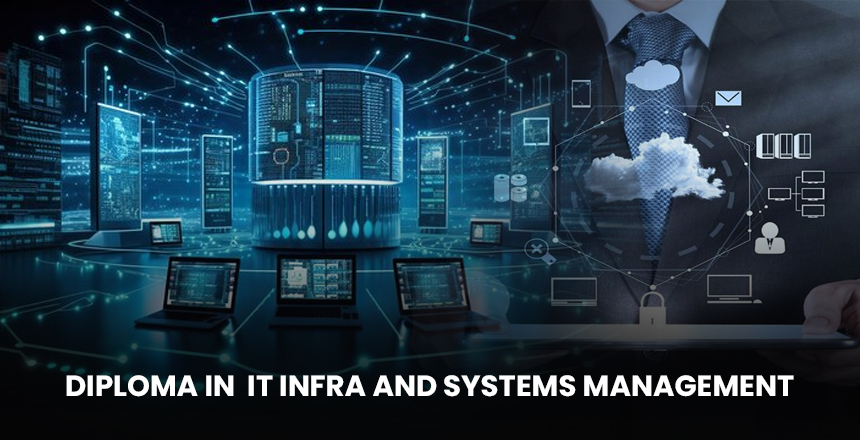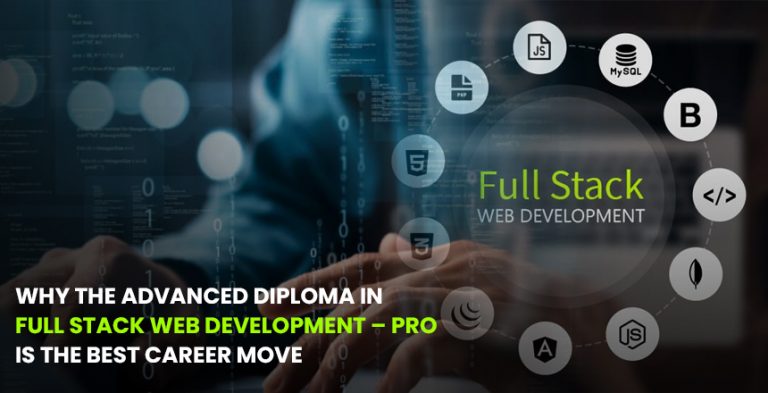Without a technical degree, you might consider beginning your IT career but need to consider pursuing this diploma in IT infrastructure and systems management. Students seeking a job-focused education should consider pursuing this diploma in IT Infrastructure and Systems Management. The curriculum of this diploma program prepares students to create, maintain, and protect the information technology foundation used by contemporary business operations. The course educates students about server management and networking as well as cloud systems and cybersecurity fundamentals, which are practical competencies for the current IT work environment.
About the Course
The Diploma in IT Infrastructure and Systems Management trains students to implement their skills in enterprise IT system management and maintenance for practical job roles. Students learn practical skills in networking through server administration and cloud platforms as well as cybersecurity skills and IT support fundamentals in this industry-specific programme. Through this programme students will perform with Windows/Linux servers alongside capabilities to manage virtualisation and conduct basic cloud operations. The programme structure fits current industry needs by developing core competencies required for system administration and IT infrastructure roles alongside technical support functions. The course serves as an ideal first step for newcomers who want to enter the expanding IT field.
- Network installation and configuration
- Server administration (Linux and Windows platforms)
- Virtualization (VMware, Hyper-V)
- Cloud platforms like AWS, Microsoft Azure, and Google Cloud
- Data storage and backup management
- Cybersecurity and endpoint protection
- Service Management frameworks like ITIL
- Nagios or other such monitoring tools
- Scripting basics (PowerShell, Bash)
Key Highlights:
- Duration: Typically 6–12 months
- The diploma requires 10+2 education from any stream along with basic computer proficiency.
- Mode of Delivery: Available in online, offline, and hybrid formats
- The following certifications are optional: CompTIA A+/Network+, Microsoft MTA, AWS Cloud Practitioner, and Cisco CCNA (depending on provider).
Learning Outcomes
- The completion of this diploma will enable students to acquire the following skills:
- Students gain expertise in establishing and maintaining LAN/WAN computer networks.
- Students can install and configure Windows and Linux operating systems while managing the platforms through their lifecycle.
- Trained individuals can operate AWS or Azure cloud consoles and execute fundamental cloud tasks.
- The student performs system troubleshooting tasks, which include addressing connectivity problems and system performance lapses
- Implement basic security protocols and backups
- Students must understand IT service management (ITSM) practices and be able to apply them.
- ServiceNow, alongside JIRA and Freshdesk, represents ticketing tools that can be used for these purposes.
- Build readiness for global IT certifications
- Students who take this course receive essential knowledge that allows them to pursue specialization in cloud computing as well as cybersecurity and system architecture knowledge.
Career Scope and Job Profiles
After graduating from this diploma program, students find work opportunities in both IT fields and non-IT sectors. Continuously seek qualified personnel who can oversee their tech infrastructure.
Entry-Level Job Roles
- IT Support Executive
- System Administrator (L1/L2)
- Network Support Engineer
- Cloud Support Associate
- IT Infrastructure Analyst
- Technical Helpdesk Technician
- Service Desk Engineer
Career Path Growth:
- With one to two years of experience, you can apply for positions that include:
- IT Infrastructure Manager
- Cloud Systems Engineer
- DevOps Associate
- Network Security Analyst
- IT Operations Lead
Top Recruiters:
- Infosys, Wipro, HCL
- Tech Mahindra, Cognizant
- Capgemini, TCS
- Amazon (Cloud/IT support roles)
- Public sector organizations and departments within government entities operate IT teams.
Student Reviews (Avg. Rating: 4.3/5)
1. Aarav M., Delhi
“I used this course to switch from retail to IT.” “They were especially useful with the labs and Linux server projects.”
2. Shruti T., Pune
Everything was so practical that I loved it. “We were trained to work with cloud platforms/handle tickets as real jobs.”
3. Imran S., Bangalore
“As a matter of fact, I had zero background in IT, but in a BPO, I’m now working as their tech support team.” Worth it!”
4. Neha G., Hyderabad
“Excellent intro to IT infrastructure. I would only recommend assistance.”
5. Rakesh K., Chandigarh
Complete the course in six months and succeed in cracking an interview for a helpdesk analyst role. Highly recommended for non-tech students.”
9. Top 10 FAQs: Diploma in IT Infrastructure and Systems Management
Q1: What is IT infrastructure management?
In other words, it is maintaining hardware, software, networks, cloud services, and other tech resources that keep an organization’s operations running.
Q2: Is this diploma good for beginners?
Absolutely, it is best for students or professionals without a technical background to kickstart their IT careers.
Q3: Is it possible to learn this course even if I am a complete beginner in coding?
Absolutely. In fact, it focuses less on software development and more on systems, networks, and the cloud.
Q4: Once done, what will be the next certifications I am eligible for?
Getting certifications such as CompTIA A+, Network+, CCNA, AWS Cloud Practitioner, and ITIL Foundation comes in handy to boost your resume.
Q5: What tools will I learn?
You will work with operating systems (Windows/Linux), virtualisation software, cloud consoles, and monitoring and ticketing tools.
Q6: Will I get a job after completing the course?
If you do IT infrastructure or IT support-type work, then most students get jobs within 3–6 months after completion.
Q7: And what is the average salary that you get after this course?
Salaries start at ₹2.5 LPA, which goes up to ₹4.5 LPA once you have certifications and experience.
Q8: Do I have the option of further study after this?
Yes. You have a BCA or B.Sc. in IT and can go for specialities like cybersecurity, DevOps, cloud computing, and so on.
Q9: What is the scale of cloud computing in the context of this course?
Almost all programmes teach you EC2, S3, IAM, and other cloud concepts in AWS and VMs and storage in Azure.
Q10: Is this course government approved?
Several institutes offer UGC- or NSDC-approved diplomas. Check accreditation before enrolling.
Final Thoughts
For anyone who wants to quickly and inexpensively enter the world of tech, a diploma in IT systems and infrastructure management is an option. It fills the void between knowing how to use a computer and doing the job. This diploma is perfect for job seekers, job switchers, and professionals looking to reskill in IT with its high job demand and diverse learning formats.








